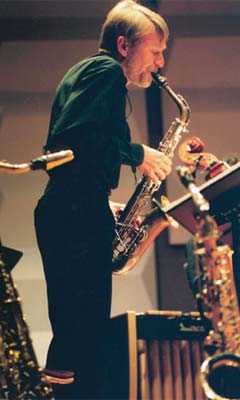Studying the Saxophone at the Conservatoire National Supérieur de Musique de Paris
Professor/Assistant (Accompanist)

© Vandoren Photo - N. Roux Dit Buisson - Recording of Tango Futur
Claude DELANGLE/Christophe Bois (Fumié ITO)
Timetable: Monday: 1 pm to 8 pm and Tuesday: 10 am to 7 pm , room 333
Duration of the studies
3 or 4 years, on a basis of one hour every week with the professor.
Objectives
Advanced training of the instrumentalist :
- development of the artistic sensitivity and the individual and collective technical mastery ;
- wide culture training in practical as well as theoretical domains (additional disciplines) ;
- bringing out the aptitude to become integrated into professional life.
Content
Study of traditional and modern repertoire on all saxophones. The study of the alto saxophone, the soprano saxophone and the tenor saxophone is compulsory.
The study of the other saxophones is optional.
Transcriptions will be used for the introduction to the soprano, tenor and baritone saxophones.
The students form teams (sonata with piano, saxophone quartet, saxophones ensemble).
The saxophones ensemble of the Conservatoire (12 saxophones) works in sessions in accordance with the concert planning.
Regular practice for recital is proposed, and memorization work is strongly encouraged.
Given that the main aim of the studies at the Conservatoire is acquiring autonomy, students are required to carry out real research work.
1) a research work of the following types :
- biographical
- discographica
- of aesthetic references
2) an analysis (in collaboration with the analysis professor)
3) a research work of “exceptional” repertoires :
- exceptional groupings
- exceptional techniques, etc…
4) an active collaboration with the composition classes; each student will have to perform at least one premiere of a composer-student of the Conservatoire. On the students suggestion, Claude Delangle will invite a composer who will do work on his piece in the class.
5) the execution of an important project during schooling – subject established in consultation with Claude Delangle; an important project on :
- repertoire
- techniques
- premieres
- etc…
The first year will mainly be devoted to reaching the standards of knowledge.
In the second year, it is possible to carry out and exchange with a foreign institution of the level of the Conservatoire (minimum two months, maximum three months).
In the third year, recording sessions with the conditions of the execution of a record are proposed. Besides, students have the possibility to get to know how to play with an electroacoustic device (magnetic band, Syter device, etc…).
In the third year and beyond, students are strongly recommended to prepare for international competitions.
Control exams
At the end of the first year :
1) a required piece; posted two months before the exam;
At the end of the second year :
1) a required piece; posted two months before the exam;
2) a piece chosen in agreement with the professor.
At the end of the third year ( finishing their instrumental degree in 4 years) :
1) a classical required piece;
2) a contemporary required piece;
3) a self-choice piece.
For no 1 and no 2, posted two months before the exam. This programme may be identical to the programme for the recital of the Prix.
Final exam
The programme of the recital of the Prix, with a duration between thirty and forty minutes, comprises :
1) a contemporary required piece; posted two months before the exam ;
2) a repertoire required piece; posted two months before the exam ;
3) one or two self-choice pieces, depending on the total duration of the programme.
Awards
Control exams: distinctions: Très Bien , Bien and Assez Bien (first class honours, second class honours and pass grade) or radiation (fail).
Final exam: Saxophone Prix.
The Diplôme de Formation Supérieure de Saxophone (degree in saxophone advanced training) is awarded to the student when he or she has obtained the following awards
- saxophone prix;
- a certificate in each of the following compulsory additional disciplines :
- analysis-instrumentalists
- musical training
- sight reading
- chamber music
- orchestra
- a certificate in one of the following optional main additional disciplines :
- choir
- writing (introduction) « A »
- history of music (introduction) « A »
- jazz (introduction)
- complementary piano
- a certificate in one optional additional discipline to be chosen by the student.
The distinction ( Très bien, Bien, Assez bien) qualifying the degree is the one awarded by the jury at the end of the recital of the Prix.
Post-graduate
The Diplôme de Formation Supérieure de Saxophone, with the distinctions Très Bien or Bien, allows the student to enter the admission exam for the post-graduate cycle.
(Cf. technical section for the post-graduate cycle/instrumentalists).